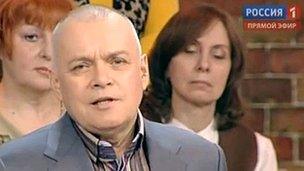Russia: Kremlin's 'hate TV' compares West to Nazis
- Published

Russian state TV presenters are using ever more extreme language to vilify government opponents - even comparing Western nations to the Nazis.
To mark the anniversary of the 1938 Munich Agreement, that handed the Czech Sudetenland to Hitler, Rossiya 1's current affairs flagship News of the Week, external likened the West's handling of Syria to the actions of Nazi Germany. "How did the Germans get the Sudetenland?" asked anchor Dmitry Kiselev. "Under the pretext of defending human rights," he answered, accusing the US, Britain and France of using talk of Syrians' rights to "encourage terrorist intervention".
A Rossiya 1, external news bulletin let Stalinist author and editor Alexander Prokhanov go even further. "Then it was Hitler, and now it is America, devouring country after country before our very eyes, before the eyes of the whole world," he said. Dubbing the US a "bloody animal", he warned Russia could be its next victim. "The Munich collusion is a lesson to us all. Not a step back. Behind Syria lies the Russian border." Neither Prokhanov nor Rossiya 1 mentioned the August 1939 Molotov-Ribbentrop Pact, by which Moscow gave Hitler the green light to invade Poland.

Kiselev is among the most vocal newsreaders
State broadcasters treat government opponents similarly. Last month, Dmitry Kiselev likened Moscow mayoral hopeful Alexei Navalny's campaign to Joseph Goebbels' propaganda machine. Popular presenter Vladimir Soloviev didn't mince words on state-owned Vesti FM, either, when he warned Jews off supporting Mr Navalny: "They think they can control him, but they will be the first to find that the doors of the gas chamber slammed shut behind them and the gas turned on."
This rhetoric disturbs many independent broadcasters, especially when directed at the Kremlin's domestic opponents. Vadim Vostrov, external, of the regional station TVK, has compared Mr Kiselev's broadcasts to the compulsory "two minutes of hate" in George Orwell's novel 1984. "The comrades are still some way from the original, but are moving in the right direction," he said of Rossiya 1. Opposition campaigners have called for state anchors to be prosecuted on charges of inciting hatred, so far to no avail. Dmitry Kiselev himself is unrepentant. "I now understand that there is no place for disengaged journalism. We have to create values," he told liberal website Lenta.ru, external.
Use #NewsfromElsewhere to stay up-to-date with our reports via Twitter, external.